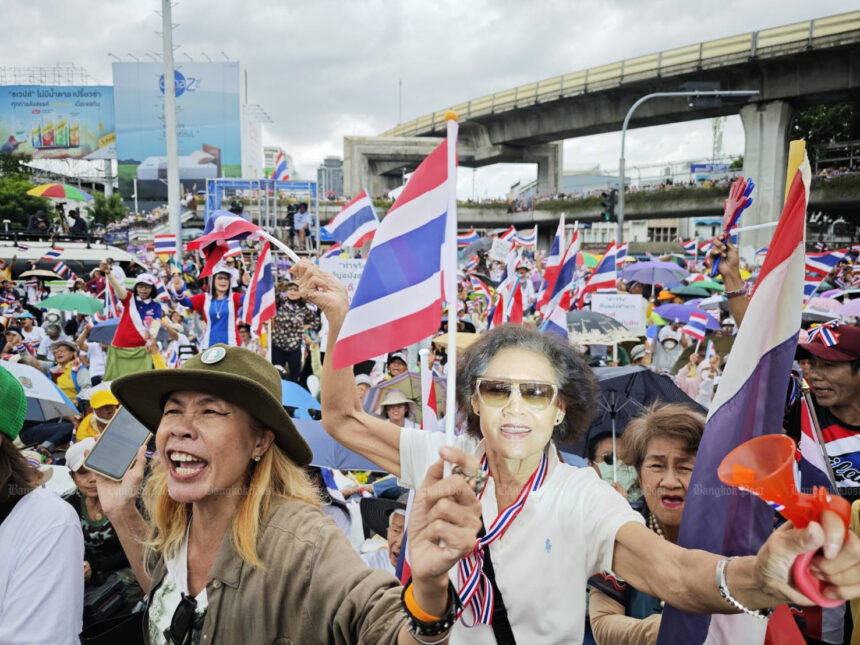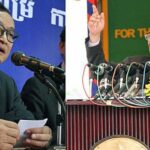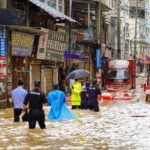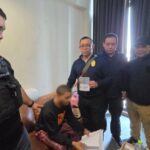BANGKOK – Victory Monument became the focus of a major protest on Saturday, as thousands gathered to urge Prime Minister Paetongtarn Shinawatra to step down. The unrest followed the release of a phone call between her and former Cambodian leader Hun Sen, which many say was mishandled during a recent border crisis.
Organised by the former yellow shirt group Ruam Palang Paendin Pokpong Athipatai, the rally was the largest against the current government since the Pheu Thai Party took office in 2023. Police estimated about 6,000 people attended by mid-afternoon, with numbers expected to exceed 10,000 later in the day.
Many in the crowd were older and had participated in past demonstrations against governments led by Paetongtarn’s father, Thaksin, and her aunt, Yingluck. While fewer wore yellow shirts than in previous protests, white clothing and accessories with the national flag were common, echoing past rallies like the Bangkok Shutdown in 2014.
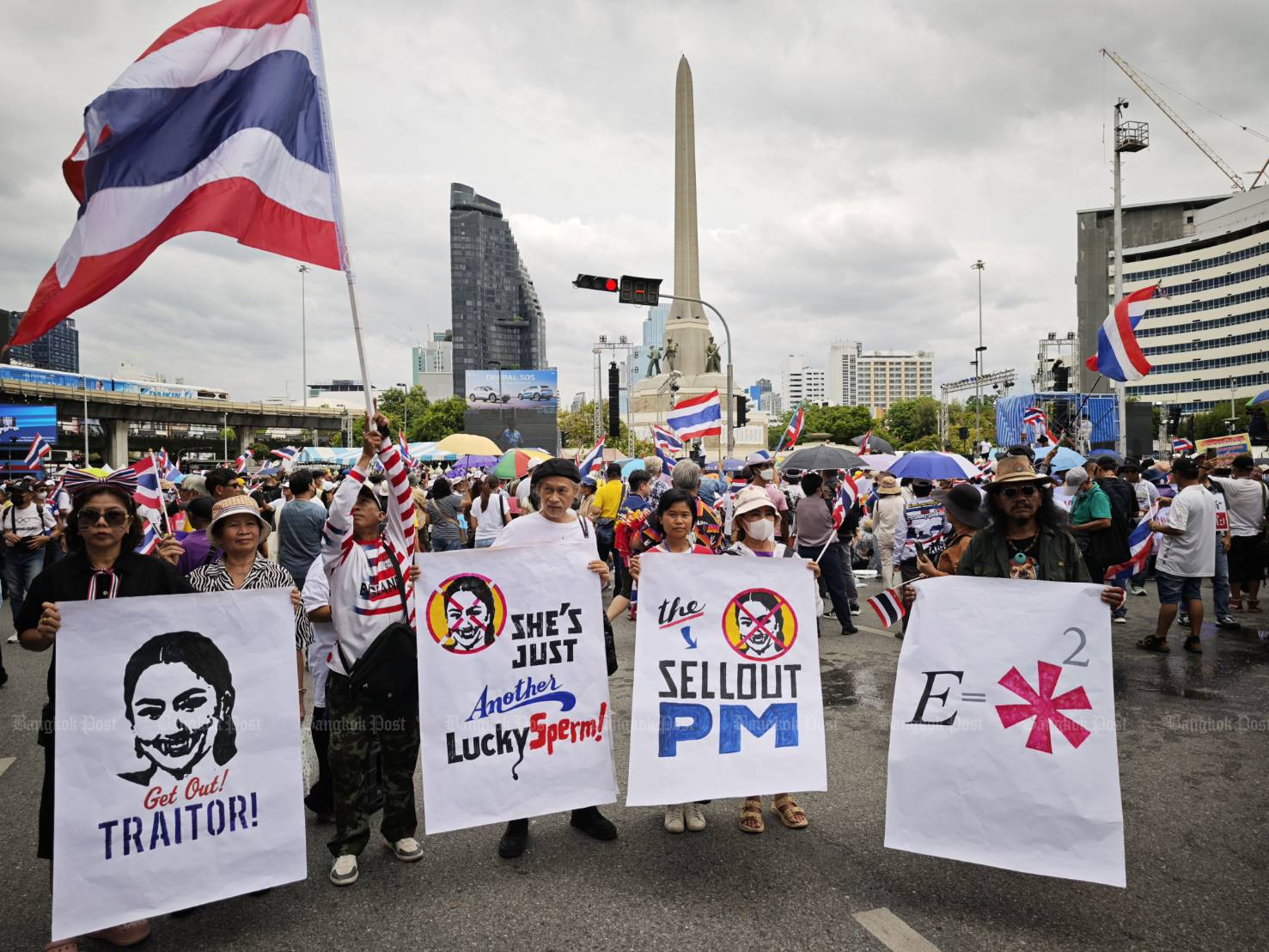
Victory Monument in Bangkok
Rain showers sent people seeking shelter under the skywalk, but spirits stayed high. Traffic near Victory Monument stayed under control at first, though congestion grew as the day went on. Authorities closed inbound sections of Ratchawithi and Phahon Yothin roads to manage the crowds and encouraged drivers to use other routes.
Demonstrators began arriving as early as 9 am, waving Thai flags. The day started with a merit-making ceremony, then continued with speeches and live music by Din Daeng Road. Well-known political voices like Jatuporn Prompan and Sondhi Limthongkul were due to speak in the evening, after everyone joined in singing the national anthem at 6 pm. Protest organisers called this a show of unity to protect Thailand’s sovereignty.
Politician Warong Detkijwikrom fired up the crowd by criticising PM Paetongtarn, claiming her actions put national interests at risk. The event was planned to finish by 9 pm, and leaders promised not to stay overnight.
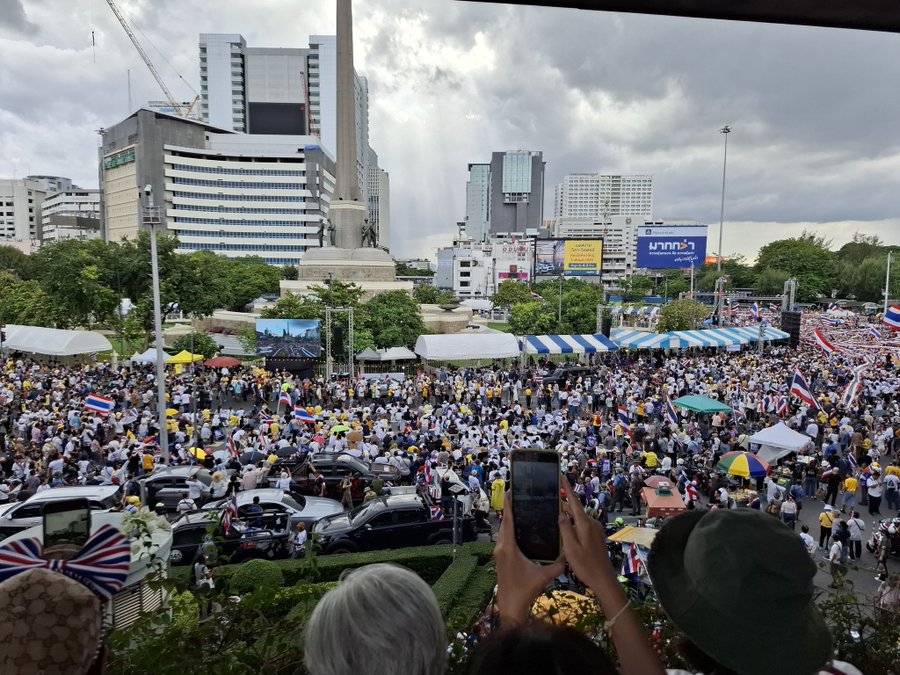
Police maintained a heavy presence, monitoring the area with more than 200 security cameras and drones. Explosive ordnance teams and K9 units were also on site. By 4 pm, officers had seized several knives and box cutters, and one person was arrested after a scuffle with police.
Another was detained on an existing warrant linked to the Computer Crime Act. Ambulances and medical staff were on standby, with several hospitals nearby ready for emergencies.
Supporters from Nakhon Ratchasima gathered early at the Thao Suranari Monument before travelling to Bangkok in buses and vans. Supot Piriyakiatsakul, leading the group, said they would keep up their effort to see Paetongtarn removed from office. In Phitsanulok, about 80 people made their way to the capital, bringing along items decorated with the Thai flag.
While visiting flood-hit areas in Chiang Rai, Paetongtarn told reporters she had asked security officials to keep an eye on the protest. She said protesters had the right to express their views, and she was open to peaceful discussions if the group wanted to talk.
Past protests did not directly bring down previous Shinawatra governments, but they did build pressure that led to court actions and coups in 2006 and 2014. Paetongtarn now faces legal scrutiny after senators filed complaints about her role in the leaked call.
The Constitutional Court will soon decide whether to accept the case, a move that could see her suspended while the investigation continues.
The Yellow Shirts represented urban elites and royalists, contrasting with the rural working class. This divide oversimplifies Thailand’s complex political landscape, as both movements included diverse supporters. The PAD’s royalist rhetoric masks elite interests in maintaining power, while their anti-democratic calls for appointed governance alienated some moderates.
The Yellow Shirts remain a symbol of royalist, anti-Thaksin sentiment, but their influence has waned. The 2014 coup and subsequent military rule under Prayuth (who became prime minister in 2019) shifted power dynamics, reducing the need for street protests.
The rise of younger, progressive movements, including student-led protests in 2020 calling for monarchy reform, has further marginalised the PAD’s royalist agenda.




